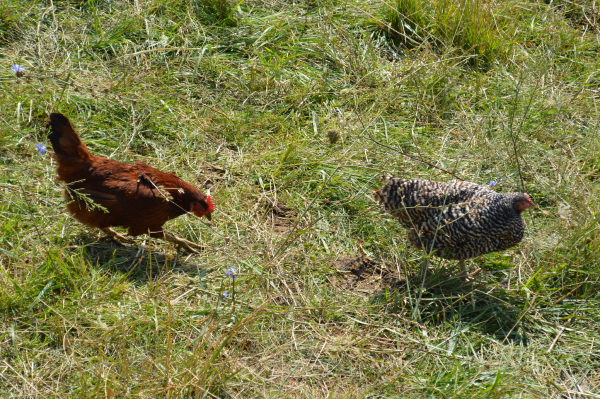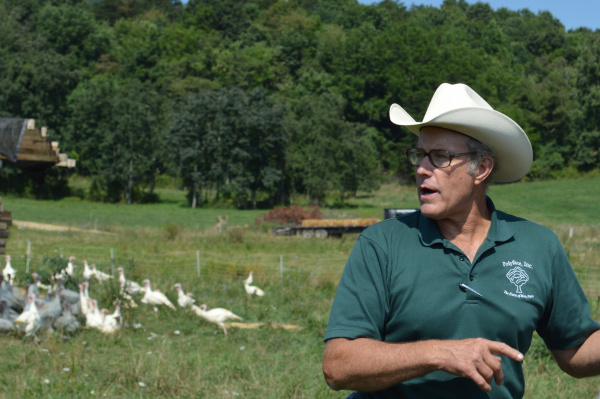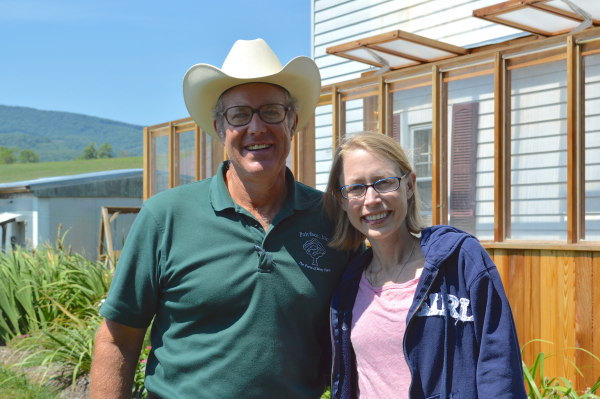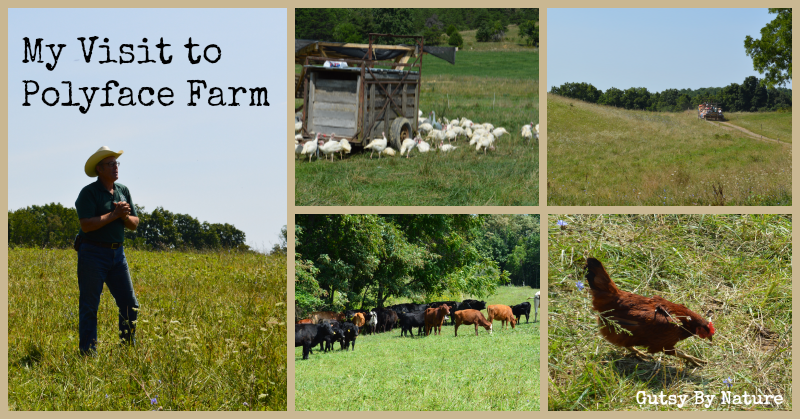“The chickens keep the earth from getting indigestion,” explained Joel Salatin on our first stop of the hay wagon tour of Polyface Farm.
“Excuse me,” asked someone a beat later. “Did you say the earth gets indigestion?”
“Indeed it does!” Salatin boomed back with his trademark enthusiasm and grin. “The soil is the earth’s stomach!”
Salatin, the self described “lunatic farmer” of Virginia, went on to explain the role of the egg laying chickens pecking around our feet. Cattle graze on the tall grass first and are rotated to a new section of pasture every day, always having available a fresh selection of greens from which they can eat. Behind them, poultry are rotated through several days later, where they get to enjoy the fly larvae left in the cow manure and can easily find other bugs and treats in the newly shortened grass. In the process, they spread the rich manure around, helping the soil to be nourished evenly which allows new grass to grow.

This symbiotic rotational grazing mimics what happens in nature when wild herds of herbivores like bison and wildebeasts move from one piece of grassland to another and flocks of migrating birds follow behind them, pecking at their droppings and serving as a clean up crew that allows the earth to naturally renew itself. A modern technological invention – portable electric fencing – allows Salatin to replicate this on his farm where he has been able to turn the previously worn out, eroded, and abused land into what is now the thriving, healthy, and highly productive Polyface Farm that services over 5,000 families, 10 retail outlets, and 50 restaurants with grass fed beef, pastured poultry and pork, and forestry products, without needing to use pesticides, artificial fertilizer, or antibiotics.
Earlier this year, I wrote about why Joel Salatin is one of my real food heroes and how I saw my own health struggle reflected in his effort to use natural practices to heal the land. So I was thrilled when I had the opportunity to join a guided tour of Polyface and participate in a private question and answer session with Joel Salatin himself this past weekend.
Our tour included visits with those egg-laying chickens in their “eggmobile,” a flock of pasture raised turkeys, a close up view of the pasture raised meat chickens, and a stop to see some of the grass fed cattle enjoying their “salad bar.” The only thing we missed was seeing the “pigerator pork,” which were currently too far away to see on that day’s tour. Along the way, Salatin explained his operation, shared his views, and answered questions.
“You can’t be too weird…”

Nothing was off limits and he was more than willing to answer his critics as well, even defending criticism by others for his practice of raising commercial breed meat chickens and turkey rather than heritage breeds. He explained that as much as we would love for the public to embrace a heritage breed, they are simply too different than what the American people expect and want when it comes to poultry. In his typical witty no-holds-barred style, he explained that you have to meet people half way if you want them to fundamentally change their eating paradigm. You can only be “so weird.”
“You can be a nudist. Or you can be a Buddhist,” he said, explaining that customers would accept either one even if it is radically different than their own practice. “But you can’t be a nudist Buddhist. That is too weird.”
What can we do?
Later, when asked by a member of the blogger’s group with whom I attended the tour exactly what we could all do to help spread the message and start to change the food production model in this country, one of specific directions he gave was to take the amount of money you would normally spend on entertainment and instead use that to connect with the local food resources in your community and start sourcing your food from them. For some farmers, just getting a handful more customers will mean they can quit their “town job” and focus on farming full time. This is crucial at a time when the average age of farmers is 60+ and young farmers are priced out of the career field, Salatin says.
To find local farmers employing sustainable practices within the United States, check out the website Eat Wild. This easy to navigate website lets you click on your state and get a listing of farms and ranches that certify they meet the site’s criteria for producing grassfed meat, eggs, and dairy products. [International readers – If you know of a similar resource in your country, please provide a link to it in the comments!]
How else can you get involved?
The Farm To Consumer Legal Defense Fund is holding its inaugural Food Freedom Fest on September 5 and 6, 2014 here in Virginia. This exciting 2 day event is an educational event and fundraiser that includes a deluxe tour of Polyface Farm, a conference featuring leaders in the real and sustainable food movement, an evening street fair in Staunton, Virginia honoring Joel Salatin, and five nutrient dense meals. Learn more about the festival and register here.
You can also purchase raffle tickets to win an all expense paid trip to the festival, but you have to hurry as it closes very soon… Learn more about that here!




